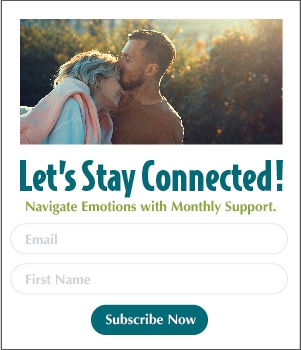In the first few years of my marriage, resentment was a frequent companion. It bubbled up so often that one day, I committed to explore why and set a goal to reach ZERO resentment. Ambitious, I know.
Fast forward to today. As a veteran in teaching emotional intelligence and having coached hundreds of couples over the years, I’ve discovered why relationship resentment is such a common splinter. However, what most people don’t recognize is the personal responsibility that is required to live resentment-free.
Estimated reading time: 5 minutes
 I’ll explore an often overlooked aspect of resentment in relationships: the role of emotional intelligence in preventing and healing resentment while creating a healthy relationship.
I’ll explore an often overlooked aspect of resentment in relationships: the role of emotional intelligence in preventing and healing resentment while creating a healthy relationship.
But let’s not get ahead of ourselves. What is resentment and why do we resent our partner in love and marriage?
"Why Do I Resent My Partner?" Possible Causes of Resentment in Your Relationship
There are many reasons people build up resentment (and other negative emotions) toward their partner. However, when resentment overshadowed my relationship, I felt fire in my gut and, at first, couldn’t tell why. It was too overwhelming.
Ask yourself these questions and see if you answer yes to any of them. They'll provide you with typical instigators of relationship resentment. (The more yes answers, the greater the resentment.)
- Do you feel neglected or unappreciated in your relationship?
- Are you struggling with communication issues or feeling misunderstood by your partner frequently?
- Have your hopes for the relationship been consistently disappointed?
- Are there trust issues and unresolved conflicts that keep resurfacing in your relationship?
- Has there been a betrayal or breach of trust that you're finding difficult to move past?
- Do you feel you're shouldering an unfair share of responsibilities or financial burden in your relationship?
- Are your needs for emotional or physical intimacy going unfulfilled?
- Does your partner frequently disrespect or belittle you?
- Are you and your partner clashing over fundamental differences in values?
- Do you often feel like you're not a priority in your partner's life?
- Are past traumas or unresolved personal issues affecting your love relationship?
- Are you experiencing resentment only toward your partner or in other areas of life?
Reflecting on these questions can help identify sources of resentment in your relationship. Recognizing these issues is the first step towards addressing them and building a healthier, more fulfilling relationship.
Related reading: "Emotional Intelligence in Relationship: Let the Magnet of Love Lead."
The Emotional Intelligence Approach to Replacing Resentment with Empowerment
It’s true that resentment can silently erode the foundation of even the most robust romantic relationships, so it’s important that we understand it.
When we don’t like something, we tend to push it down, shove it away, or view it as “bad.” Often, we want to get rid of it. Resentment is no different. However, if you view emotions as your own private GPS system and a valuable tool, you’ll discover a goldmine of useful information.
Every emotion has a purpose, providing reliable insights into our needs and experiences. Emotions are the brain’s impetus to action. Resentment, often viewed negatively, significantly guides us toward healthier relationships and personal growth.
Resentment is a blend of several feelings: anger, bitterness, disappointment, and sometimes hostility or disgust. It is a complex emotion that arises when we feel perceived mistreatment or unmet expectations. Resentment can be signaling us that something vital for our well-being has been neglected or even violated. We can have conflicting feelings, which escalate the toll that harboring resentment takes on our emotional and mental health.
The Purposes of Resentment that Are Indispensable to Our Relationships
It may be a new concept for you that each feeling has a purpose; it is for most of my clients. Sometimes, we view negative emotions as an annoyance or something to be stopped or fixed. However, resentment serves several essential purposes in relationships:
 Highlights Unmet Needs
Highlights Unmet Needs
When we harbor resentment, it often indicates that our emotional or physical needs are unmet. By paying attention to these feelings, we can identify what we require in our relationship and take steps to address these needs.
Example: If you feel resentful because your partner doesn't spend enough quality time with you, this emotion may highlight your need for connection, emotional support, and attention. The resentment is attempting to motivate you to advocate for yourself, build healthy communication, and prioritize quality time.
 Signals Boundary Violations
Signals Boundary Violations
Resentment can arise when our personal boundaries are crossed, and we are treated unfairly. When we or our partner feel resentful, it serves as an emotional response telling us that we need to establish a limit and possibly set boundaries to safeguard our well-being.
Example: Feeling resentful when a partner consistently makes decisions without consulting you may indicate that your need for mutual respect and collaboration is disrespected.
 Encourages Self-Reflection
Encourages Self-Reflection
Resentment prompts us to reflect on our feelings and the dynamics of our relationship. Self-awareness leads to personal growth and a deeper understanding of our values and expectations.
Example: Reflecting on why you feel resentful about your partner's career might reveal your discontent with your own job, a desire for a career you love, or perhaps a need for more balanced support in the relationship if your partner is working too much.
 Motivates Change
Motivates Change
The discomfort of resentment can motivate us to take action and make necessary changes in our relationships. It pushes us to communicate our feelings, seek resolution, and improve our interactions.
Example: Resentment over unequal household responsibilities might motivate you to candidly discuss with your partner the possibility of sharing chores more equitably.
The Self-Awareness Factor
One of the most critical components of emotional intelligence is self-awareness. When we're more attuned to our emotional states, we can catch feelings of resentment early before they fester and grow. This self-awareness allows us to:
- Identify the specific actions or situations that trigger negative feelings.
- Understand the underlying needs or values that aren't being met.
- Take responsibility for your emotional experience rather than blaming your partner.
When we lack self-awareness, we may not know what's important to us or what we need, and we might feel like everything that's wrong in a relationship is our fault.
It’s up to us to act on what is important to us. How can we if we don't know what we need or want? A common dilemma of people-pleasers, which undermines healthy relationship dynamics.
It's easy to think our partner is responsible for what we feel, need, and want.
Of course, partners in marriage and relationships are intended to care for one another, but it’s a misconception that it’s our partner’s responsibility to meet our needs.
It’s not.
Our needs and desires are OUR responsibility.
This revelation was big for me. When I resented my husband because he didn’t anticipate my needs, such as when I felt overwhelmed by our growing family, it was unfair. Once I asked for what I needed kindly yet firmly, amazingly, I got far better results.
Our partners are not mind readers, and their priorities can be vastly different from ours. We must not assume that they are on the same wavelength as we are; we all live in private, unique universes within ourselves.
Keep your standards, but let go of your expectations.
The other conundrum that couples face is expecting something from their partner that they are unwilling or unable to give.
For instance, early in my marriage, I resented that my husband seemed to prefer spending time with his buddies rather than me.
Hmm… resentment, there it is again.
It turned out I wasn’t all that much fun to be with. If I wasn’t criticizing my husband about something, I would blame him for my disappointment, letdown, or being overwhelmed. If I wasn’t blaming, I was complaining.
A real drag, right?
Then, I set about my endeavor: ZERO RESENTMENT.
Every time I resented my husband (or anyone else), I checked in with myself to see what I needed. Then, I asked if this was my responsibility or a shared responsibility. What did I need and want that was reasonable?
Next, I assessed if I was holding up my end of the bargain.
Was I bringing the quality I desired into our marriage, such as affection, thoughtfulness, or appreciation?
If the answer was no, then I focused on changing my own behavior instead of his. Once I changed my own behavior and consistently modeled the love and respect I expected, my husband reciprocated, if by magic—the power of personal change!
We can’t change someone, but by responding differently, we invoke a different response from them.
Another thing I realized was that you’re much more likely to get what you want when you have a meaningful conversation that considers BOTH people’s experiences, feelings, desires, needs, and preferences.
Unfortunately, win-win solutions are rarely in couples’ vocabulary. Most couples believe that compromise is the solution. They don’t know how to resolve conflicts, so both are happy—even ecstatic—about the outcomes. Thus, relationship issues continue.
Without true conflict resolution, the blame game and reoccurring problems in communication are more likely.
(Yes, I did say ecstatic… that’s the goal anyway.)

Empathy as a Resentment Antidote
Empathy, another key aspect of emotional intelligence, is crucial in preventing and healing resentment. It is one of the EQ skills I teach most in couple’s counseling.
When we truly put ourselves in our partner's shoes, we're less likely to attribute negative intentions to their actions. This shift in perspective can transform potential resentment into understanding and compassion.
Empathy is the ability to understand and share another person’s feelings. Pretty vital in a love relationship, right?
However, empathy is for ourselves, too. And giving empathy and self-compassion will help to alleviate resentment and bitterness.
Empathizing with our partner requires an emotional connection that allows one to experience another's perspective and emotions as if they were their own. This deep level of understanding can be crucial in resolving conflicts and mitigating resentment. When resentment builds up in a relationship, it often leads to emotional distance, reduced empathy, and increased conflict.
Empathy can counteract these effects in several ways:
![]() When feelings are validated, the person softens and is more open to hearing and understanding their partner’s perspective and feelings.
When feelings are validated, the person softens and is more open to hearing and understanding their partner’s perspective and feelings.
When one partner feels heard and understood, it can significantly reduce resentment. Validation does not necessarily mean agreeing with the other person’s perspective but acknowledging their reality is real and valid.
![]() Empathy oils communication.
Empathy oils communication.
Effective communication is essential for resolving resentment, and empathy is critical in this process. Empathizing with the other person causes intense feelings to dissipate. When feelings are felt, open and honest communication is possible.
Empathy softens the tension in conflict, reducing the likelihood of escalation. When partners demonstrate understanding and concern for each other's feelings, the atmosphere shifts from adversarial to cooperative, making addressing the underlying issues causing resentment easier.
![]() Empathizing promotes understanding and forgiveness.
Empathizing promotes understanding and forgiveness.
Forgiveness is often a necessary step in overcoming resentment, and empathy can facilitate healing, building a bridge between the couple. By understanding the reasons behind a partner's actions and acknowledging their feelings, individuals may find it easier to let go of resentment and move forward. True understanding paves the way for closeness.
Related reading: "How to Use Empathy to Strengthen Your Marriage."

Practical Strategies for Developing Empathy
To effectively use empathy to overcome resentment, couples can adopt several practical strategies. Each one takes practice but, when mastered, eliminates the majority of conflict in relationships.
 Actively Listen
Actively Listen
Active listening is one of the most fundamental ways to build empathy and understanding. Many people THINK they are great listeners, but they often miss significant aspects of what the other person is saying and overlook vital body language cues.
To be successful in empathizing, we must press pause our thoughts, ideas, and beliefs long enough to genuinely listen and understand. Unfortunately, impatience is a common challenge.
We want a solution NOW.
We want to make our partner feel better NOW.
We want to move on NOW.
If you're the one feeling resentment, empathize with yourself. Listen carefully to what you need and take action. Communicate with your partner how you can work together to help each other feel loved. Figure out ways you both can take time for self-care AND time as a couple.
If your partner is resentful, listening is critical.
Here are the key elements to know IF you are listening effectively!
YOU:
- Give your FULL attention to your partner when they're speaking. (No answering texts, half-watching the news, or interrupting.)
- Focus on understanding their perspective rather than planning your responses.
- Reflect back what you've heard to ensure you understand without making assumptions or superimposing your own experience over theirs.
- Listen without interrupting. Interrupting is a sure sign that you’re not present. Earnestly concentrate on hearing what your partner is saying and feeling without justifying your position or seeking to convince them of yours.
- Suspend judgment on what they are saying or how they are saying it. Yes, it’s easier said than done.
- Create a safe space for honesty and openness.
This first communication skill is difficult when our emotions are elevated. Sometimes, it’s critical to self-calm before attempting it.
 Perspective-Taking
Perspective-Taking
Make a conscious effort to see the situation from your partner's point of view. Consider their motivations, challenges, and emotional state. Instead of making assumptions, ask thoughtful questions to better understand your partner's experience.
Being genuinely curious requires a person to relinquish what they want to say or what they disagree with.
In seeking to understand your partner, it’s critical that you:
- sincerely care about their thoughts and feelings.
- modulate your own emotions to listen intently.
- desire an authentic connection with your partner.
- surrender an attachment of them seeing things through your eyes.
- are willing to be influenced, even if they may be wrong.
If one or more of these are missing, seeing another’s perspective is difficult.
 Validate them and convey that you understand.
Validate them and convey that you understand.
Verbalize your understanding of your partner's feelings and perspectives. This response can be as simple as saying, “I can see why you would feel that way.” Or “It makes sense to feel resentment.”
As much as possible, your job is to help your partner KNOW that you:
- care about them even when their upset feelings may center around you and your actions.
- are doing your best to connect with them sincerely.
- are willing to honestly look at what they’re sharing without justifying or rationalizing. (This was a tough one for me. 🙄)
- will take what they have shared seriously and consider it thoroughly.
- make an effort to change hurtful behaviors and step into the relationship more authentically.
So the next time you feel the stirrings of resentment, pause and listen.
What is the feeling trying to tell you?
Use it as a catalyst for positive change, and you'll find that even the most challenging situations can lead to deeper love and connection.
Related reading: "Top Challenges in Relationships: How to Keep Love Alive!"
Closing Thoughts
As you can see, resentment, often viewed as a destructive force in relationships, can be a powerful guide when approached with the right mindset.
Through the lens of emotional intelligence, we understand that every emotion, including resentment, has a purpose. It acts as our emotional GPS, highlighting unmet needs, signaling boundary violations, and encouraging self-reflection and change.
The presence of resentment signifies a call to action, NOT that you’re with the wrong person.
It invites you to look inward, understand your needs, and work with your partner to build a more balanced and fulfilling partnership.
By acknowledging and addressing resentment constructively, you can convert conflicts into opportunities for growth and deeper connection. This process involves increasing self-awareness, practicing open communication, setting clear and healthy boundaries, and nurturing empathy.
When both partners commit to these practices and acknowledge resentment as a valuable emotional signal, your relationship will grow in intentional mastery.
Then, you can create a relationship where trust, understanding, and mutual respect flourish.
So, is it possible to have zero resentment?
Yes, IF, on a daily basis, you choose love.
For more great content, sign up for our HeartMail newsletter.










